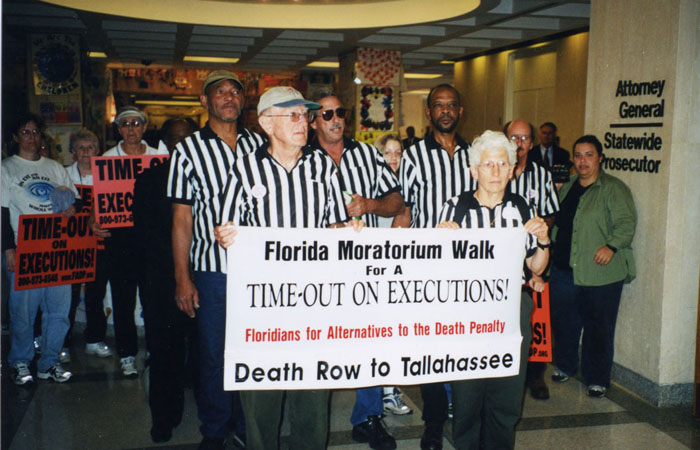Collections : [National Death Penalty Archive]
National Death Penalty Archive
Researchers, writers, activists, and records on capital punishment in the United States.
Search Constraints
Start Over You searched for: Collecting Area National Death Penalty Archive Remove constraint Collecting Area: National Death Penalty Archive Date range 2005 Remove constraint Date range: <span class="single" data-blrl-single="2005">2005</span>Search Results
Communications, 1983-2013 2.6 cubic ft.
The communications series encompasses mailings, newsletters, and events that Mr. Bonowitz participated in.
Administration, 1988-2008 1.0 cubic ft.
This series consists of administrative materials of Virginians for Alternatives to the Death Penalty including meeting minutes, calendars, and notes.
Administrative Files, 1977-2005, Undated 1.9 cubic ft.
Series 1 contains documents relating to the internal procedures and finances of Murder Victims' Families for reconciliation. While there are a few documents that provide evidence of how the organization was set up, the majority of documents focus on hiring, day to day finances, and committee meetings. There are also materials related to strategic planning and the creation of by-laws and organizational procedure. Although the series contains materials from 1977 to 2005, the bulk of the material is from 1996 to 2004. Contained in this series are meeting agendas, meeting minutes, meeting summaries, correspondence, annual reports, ballots, evaluation forms, applications, newsletters, fliers, budgets, financial reports, manuals, by-laws, pamphlets, drafts, notes, reports, contracts, forms, resumes, proofs, floppy disks, and cassettes.
Appellate Briefs, 2000-2007 6.3 cubic ft.
The appellate brief series is compiled of the appellate brief transcripts filed with the State of New York Court of Appeals from the seven cases that the Capital Defender Office represented on. The materials are arranged alphabetically by defendants last name.
Capital Defender Office Records, 1975-2007, bulk 1995-2007 116.73 cubic ft.
Steven King Ainsworth Papers, 1993-2018 .33 cubic ft.
Bill Babbitt Collection, 1967-2016 4.82 cubic ft.
Manny Babbitt, 1967-1999, Undated 1.83 cubic ft.
The series consists of the contents of Manny Babbitt's cell at the time of his execution in May 1999, materials relating to his time in San Quentin, and documents about his Marine Corps service. This series contains Manny Babbitt's original works, including several poems. There also is an empty cardboard box which housed Manny Babbitt's personal items in his cell. Please note that the dates for the series are not inclusive and the bulk of files date from the 1990s.
Bill Pelke Papers, 1965-2007, Undated 18.32 cubic feet
Calendars, Notebooks, and Desk Reference, 1994-2010 1.8 cubic ft.
Includes David C. Baldus's daily desk calendars, general notebooks, and material that appears to have been kept on hand as desk reference.
David Baldus Papers, 1965-2011 192.3 cubic ft.
Capital Jury Project, 1941-2011 81.8 cubic ft.
- « Previous
- Next »
- 1
- 2
- 3
- 4
